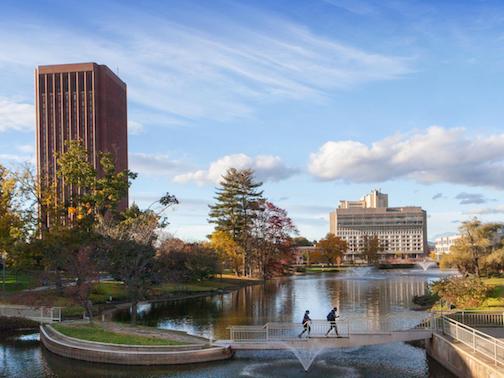
Unfortunately, the National Science Foundation has instructed SFS programs nationwide that it will not accept new scholars. Therefore, UMass Amherst is not accepting SFS applications at this time. If we are instructed to allow new applications, we will update this website.
Through the CyberCorps: Scholarship for Service (SFS) program (click link for more details), University of Massachusetts Amherst provides scholarships to students studying in the field of Cybersecurity. Scholarship recipients will complete either a Bachelor's or Master's degree in diverse Cybersecurity-related programs. After graduation, participants must fulfill a government service obligation for a period equivalent to the length of their scholarship, which must be two full academic years (four regular semesters).
Current UMass Amherst undergraduate or graduate students enrolled in the Computer Science degree program (not Informatics) at the College of Information and Computer Sciences or the departments of Mathematics & Statistics and Electrical & Computer Engineering are eligible to apply. Students studies must be focused on security. Students must expect to graduate and enter the work force two years (four semesters) after the semester they expect to start the SFS program. The scholarship is not available for less than four semesters.
Academic-year stipends are $27,000 per year for undergraduate students and $37,000 per year for graduate students. In addition, SFS scholarships cover all tuition and education-related fees but it does not include items such as meal plans, housing, or parking. And thirdly in addition, a professional allowance is $6,000 per academic year is provided that is restricted to pre-approved expenses that include travel and registration for the SFS Job Fair, travel to academic conferences, research materials and supplies, a laptop, books, professional training and certifications; the categories are limited.
|
Graduation Date |
Apply for SFS (Scholarship |
First Semester of |
|
December 2026 |
Fall 2024 |
Spring 2025 |
|
May 2027 |
Spring 2025 |
Fall 2025 |
|
December 2027 |
Fall 2025 |
Spring 2026 |
|
May 2028 |
Spring 2026 |
Fall 2026 |
|
December 2028 |
Fall 2026 |
Spring 2027 |
Applicants are required by federal law to be a US citizen or permanent resident who can obtain federal security clearance.
We strongly encourage applications from women and other underrepresented groups.
The SFS Program is offered and funded through the National Science Foundation (NSF) in collaboration with the Department of Homeland Security (DHS).